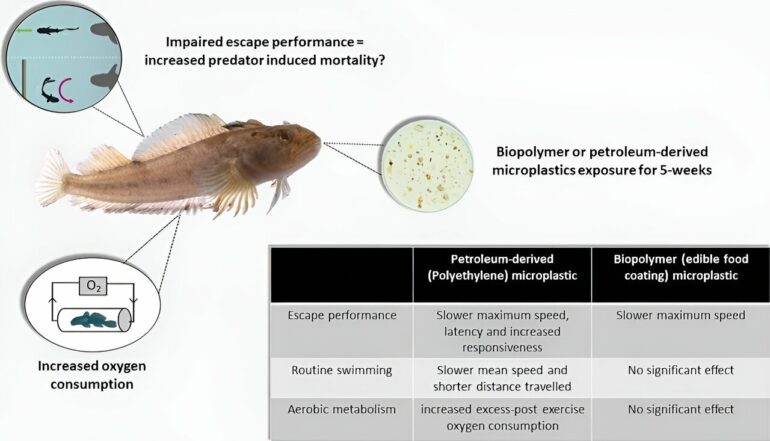Biodegradable plastics may not be the solution to plastic pollution many hoped for, with a University of Otago study showing they are still harmful to fish.
Petroleum-derived microplastics are known to impact marine life, but little is known about the impact of biodegradable alternatives.
The study, published in Science of the Total Environment, is the first to assess the impact petroleum-derived plastic and biodegradable plastic have on wild fish.
Lead author Ashleigh Hawke, who completed a Master of Science in Otago’s Department of Marine Science, says petroleum-derived plastic exposure negatively affected the fishes escape performance, routine swimming, and aerobic metabolism.
In contrast, those exposed to bioplastics only had their maximum escape speed negatively affected.
She says the research is significant as it demonstrates that both petroleum-derived plastics and biodegradable plastics can be damaging to marine fish, should they be exposed to them.
“Biodegradable plastics may not be the silver bullet to plastic pollution as we believe them to be.
“Although they are not as bad, they can still cause negative effects to those animals that may be exposed to them—in the case of this study, populations would decline as their escape behaviors are impaired.”
Co-author Dr. Bridie Allan, also of the Department of Marine Science, says more needs to be done at a policy level to protect marine environments.
“The development of traditional plastics has been well established for decades and so there is little variation in the production of them. However, because biodegradable plastics are a relatively new area, there is variation in the way they are manufactured and the materials that are being used.
“This research shows that the raw materials used in these products matters and that the use of them should be more regulated and controlled.”
The biodegradable plastic used in the study was created by Dr. Stephen Giteru, under the supervision of Professor Indrawati Oey, in Otago’s Department of Food Science.
More information:
Ashleigh M. Hawke et al, Exposure to petroleum-derived and biopolymer microplastics affect fast start escape performance and aerobic metabolism in a marine fish, Science of The Total Environment (2023). DOI: 10.1016/j.scitotenv.2023.167423
Provided by
University of Otago
Citation:
Research shows biodegradable plastics are still harmful to fish (2023, October 19)



